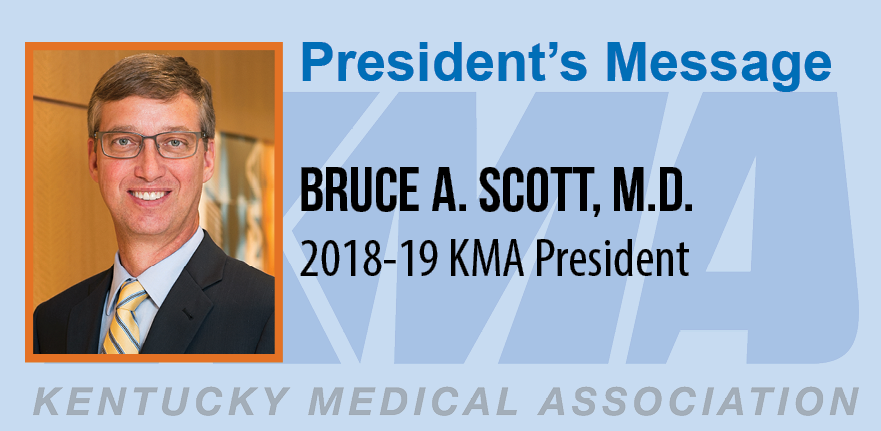
Posted June 17, 2019
Tobacco usage among Kentucky adults is nearly double the national average. Annual smoking related healthcare costs in Kentucky total $1.9 billion dollars, of which nearly $600 million is covered by Medicaid. That is $1,116 per Kentucky household in state and federal taxes for government spending on tobacco-related health care. Beyond the financial cost, the human costs of pulmonary disease and cancer are well documented. These “shocking” statistics are not surprising to physicians – we see the impact of tobacco in our practices every day.
Long ago the tobacco companies realized the best way to ensure adult smokers is to hook them early. In fact, 90 percent of adult smokers started using tobacco before age 18 and 3/4 of teenage smokers will end up as adult smokers. These smokers are aging and dying every day; so, to guarantee continued profits, the tobacco companies need a new generation of smokers.
Remember Joe Camel, a cool cartoon character in the 1980’s who was often seen smiling down from billboards strategically placed near high schools and in print magazines read by teenagers to promote smoking? Joe, and other similar promotional materials directed at youth, disappeared years ago in response to pressure from medical groups and ultimately federal action. Now the same companies, despite their rhetoric otherwise, have introduced electronic cigarettes (e-cigarettes) with flavors that appeal to youth such as “cotton candy,” “unicorn vomit” and “bubble gum.” Do you think these flavors are designed to help a 50-year-old smoker quit or to get a 15-year-old to start smoking?
Unfortunately, the strategy is working – 26 percent of Kentucky high school students and eight percent of middle school students use tobacco products. These rates are double the national average, and the problem is rapidly worsening with vaping and e-cigarettes. A recent report from the state Substance Abuse Prevention Program found use of e-cigarettes and vaping among Kentucky youth has nearly doubled from 2016 to 2018.
The key to capturing a teenage smoker is nicotine. Nicotine is highly addictive, particularly to the still developing brain of a teenager. Nicotine impairs brain function, reduces impulse control and inhibits learning – the last things teenagers need. A single JUUL pod, a popular e-cigarette product, has as much nicotine as a pack of cigarettes, and JUUL sales have sky-rocketed over 600 percent from 2016 to 2017. The next generation of nicotine addicts is growing every day!
It is no surprise that vaping and e-cigarette usage are on the rise. First, there is the perception they are safe alternatives to smoking, and some parents have expressed they consider e-cigarette usage by their teens as “acceptable.” In a recent study, almost 2/3 of teens said they were unaware that e-cigarettes contained nicotine. The devices, designed to look like a flash drive or a pen, are easy to conceal, and the absence of smoke and cigarette smell makes detection by administrators and teachers more difficult. Students reportedly charge them on their computers and then take vape hits in hallways and even in the classrooms of our middle schools and high schools.
How can we as physicians respond? First, we need to make sure we are educating our patients, particularly our teenage patients and their parents, about the true dangers of vaping and smoking. Educational campaigns such as those supported by your Kentucky Medical Association (KMA) along with the Foundation for a Healthy Kentucky, play an important role. Local school districts are displaying anti-vaping posters and adding educational materials in middle and high school health classes. Meanwhile, KMA will continue to support state and federal legislation aimed at reducing the epidemic. Recently passed KY House Bill 11, which prohibits the use of tobacco products, including e-cigarettes, on school properties and at school functions, was a good step forward. Unfortunately, this legislation included provisions to allow local school districts a limited amount of time to opt out of the prohibition. As concerned citizens and healthcare professionals, we should be active with our local school boards to make sure that they do not make this mistake. In addition, we hope to see an overall increase in the tobacco tax along with state legislation to remove the exemption of e-cigarettes from tobacco excise taxes. On the federal level, KMA supports FDA regulation of vaping products as well as bipartisan legislation recently introduced by Senator Mitch McConnell and co-sponsored by fellow tobacco-state colleague, Virginia Senator Tim Kaine (D-Virginia), that would raise the minimum purchase age for all tobacco products, including vaping products, from 18 to 21. Read KMA’s statement supporting this legislation.
For the sake of the next generation, hopefully with education and pressure from physicians, nicotine-loaded youth-appealing e-cigarettes will soon go the way of Joe Camel.

